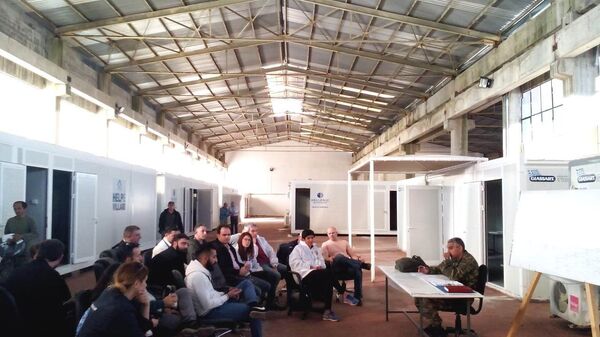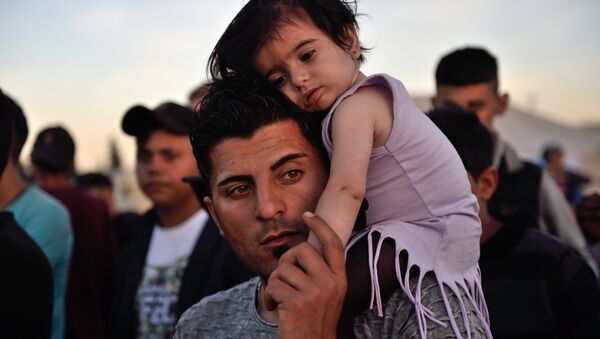Under the terms of the agreement, brokered at the last minute at a summit in March, all new "irregular" migrants and asylum seekers arriving from Turkey to the Greek islands after March 20, whose applications for asylum have been declared inadmissible, are being returned to Turkey. The EU has agreed to resettle a Syrian from Turkey to the EU for every Syrian returned to Turkey from the Greek islands.
"Fragmentation makes us vulnerable". Today's decisions on #securityEU, #EUTurkey & #Ukraine: https://t.co/GftNB6r2de https://t.co/nIYpJVh5IO
— European Commission (@EU_Commission) 20 April 2016
However, the plan has drawn massive criticism from NGO's and the UN Refugee Agency UNHCR, who says the plan flies in the face of the Geneva Convention, because the so-called 'hotspots' where migrants awaiting asylum decisions are detention centers.

Moreover, critics say Turkey does not have sufficient resources to look after refugees humanely and is even accused of mistreating migrants and even sending them back over the border to Syria. Amnesty International has revealed what it describes as the "open secret" — that refugees from Turkey are being returned to war-torn Syria in contravention of international law.
Thousands of refugees are trapped in Greece right now. Demand Europe stands #WithRefugees! https://t.co/lYJeKCkx58 pic.twitter.com/KsLS8HQqSp
— AmnestyInternational (@AmnestyOnline) 18 April 2016
"In their desperation to seal their borders, EU leaders have willfully ignored the simplest of facts: Turkey is not a safe country for Syrian refugees and is getting less safe by the day. The large-scale returns of Syrian refugees we have documented highlight the fatal flaws in the EU-Turkey deal."
EUTurkey double-speak deal a mix of wishful thinking cynical thinking and desperate thinking. Can't respect rights & return 2 Turkey. Simple
— John Dalhuisen (@DalhuisenJJ) 18 March 2016
"It is a deal that can only be implemented with the hardest of hearts and a blithe disregard for international law," said John Dalhuisen, Amnesty International's Director for Europe and Central Asia.
Inhumane Conditions
In its first assessment of how the EU-Turkey deal is proceeding, the European Commission admitted:
"Further efforts are required by Turkey to make sure that those who need international protection receive the kind of support they most require."
That is seen as diplomatic-speak, suggesting Turkey has a long way to go before its refugee camps meet international standards, providing shelter, food and humanitarian relief.
"The first result of our cooperation with Turkey is that the message is starting to get through that turning to smugglers is the wrong choice to make. In the past three weeks we have seen a sharp decrease in irregular arrivals, which now needs to go hand-in-hand with opening up the legal channel of resettlement to those in need of protection," European Commission First Vice-President Frans Timmermans said.
New Factsheet: The Facility for Refugees in Turkey https://t.co/Xdc6NpvDXR pic.twitter.com/b89teAjNAy
— Frans Timmermans (@TimmermansEU) 20 April 2016
Turkey has turned up the diplomatic heat over the deal as — in return for agreeing the relocation plan — Ankara wants its accession to the EU accelerated and visa-free travel for its citizens by June, 2016.
However, many critics say Turkey fall short of international standards of human rights and is oppressing independent media. Lawmakers in the European Parliament have called on the European Commission and Council to reassess the whole strategy behind the accession process negotiations with Ankara.
1 month of #EUTurkeyDeal today—& only 129 refugees have been relocated to N.Europe. RT if you agree this must change pic.twitter.com/1n0NWWLbzl
— IRC Intl Rescue Comm (@theIRC) April 20, 2016
Alexander Lambsdorff, Vice President of the European Parliament and shadow rapporteur on Turkey, said: "The rule of law, press freedom and freedom of expression are core values of the European family and the liberal group.
Re-assessing the entire accession process, together with the demand to respect all life-styles, secular or religious, and the refusal to link the negotiation process with the refugee crisis, are among the most important messages to the Turkish government in this report. It is simply unacceptable to open new chapters when, at the same time, freedom of the media in Turkey is being restricted dramatically every day."


